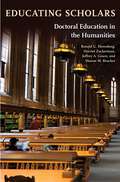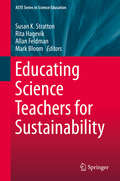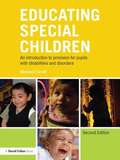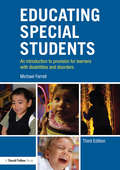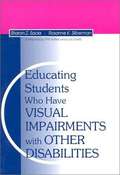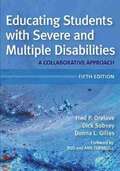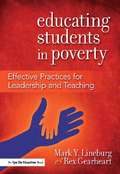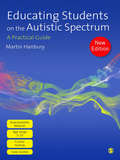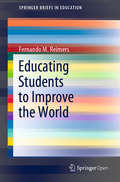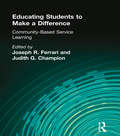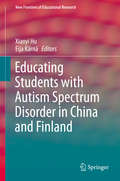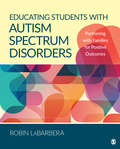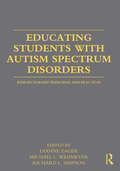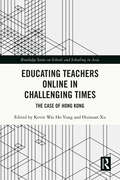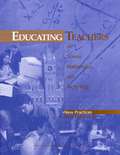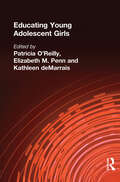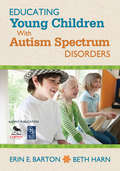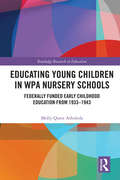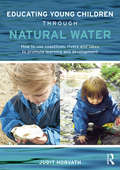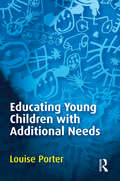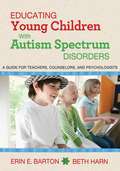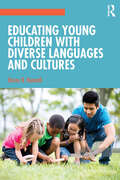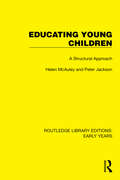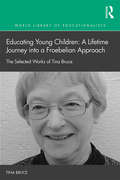- Table View
- List View
Educating Scholars: Doctoral Education in the Humanities
by Ronald G. Ehrenberg Harriet Zuckerman Jeffrey A. Groen Sharon M. BruckerMeeting the challenges faced by today's U.S. doctoral humanities programsDespite the worldwide prestige of America's doctoral programs in the humanities, all is not well in this area of higher education and hasn't been for some time. The content of graduate programs has undergone major changes, while high rates of student attrition, long times to degree, and financial burdens prevail. In response, the Andrew W. Mellon Foundation in 1991 launched the Graduate Education Initiative (GEI), the largest effort ever undertaken to improve doctoral programs in the humanities and related social sciences. The only book to focus exclusively on the current state of doctoral education in the humanities, Educating Scholars reports on the GEI's success in reducing attrition and times to degree, the positive changes implemented by specific graduate programs, and the many challenges still to be addressed.Over a ten-year period, the Foundation devoted almost eighty-five million dollars through the GEI to provide support for doctoral programs and student aid in fifty-four departments at ten leading universities. The authors examine data that tracked the students in these departments and in control departments, as well as information gathered from a retrospective survey of students. They reveal that completion and attrition rates depend upon financial support, the quality of advising, clarity of program requirements, and each department's expectations regarding the dissertation. The authors consider who earns doctoral degrees, what affects students' chances of finishing their programs, and how successful they are at finding academic jobs.Answering some of the most important questions being raised about American doctoral programs today, Educating Scholars will interest all those concerned about our nation's intellectual future.
Educating Science Teachers for Sustainability
by Susan K. Stratton Rita Hagevik Allan Feldman Mark BloomThis volume contains a unique compilation of research and reflections representing multiple vantage points stemming from different parts of the world that can help science educators and teacher educators in finding ways to meaningfully and purposefully embed sustainability into teaching and learning. It is a rich resource for exploring and contextualizing sustainability-oriented science education. At this time we find ourselves in a situation in which the earth's ecological system is under significant strain as a result of human activity. In the developed world people are asking "How can we maintain our current standard of living?" while those in the developing world are asking "How can we increase the quality of our lives?" all while trying to do what is necessary to mitigate the environmental problems. This volume responds to these questions with a focus on educating for sustainability, including historical and philosophical analyses, and pedagogical and practical applications in the context of science teacher preparation. Included are many examples of ways to educate science teachers for sustainability from authors across the globe. This text argues that issues of sustainability are increasingly important to our natural world, built world, national and international economics and of course the political world. The ideas presented in the book provide examples for original, effective and necessary changes for envisioning educating science teachers for sustainability that will inform policy makers.
Educating Special Children: An introduction to provision for pupils with disabilities and disorders
by Michael FarrellEducating Special Children is the definitive guide to evidence-based practice and professionally informed approaches in provision for special children. Now in its second edition, this book outlines ideas of best practice that relate to various disabilities and disorders and helpfully discusses what might constitute effective provision. International in its scope, it explores issues surrounding: communication disorders and autism and Asperger's Syndrome developmental co-ordination disorders reading, writing and mathematics disorders disorders of conduct, anxiety and depression attention deficit hyperactivity disorder mild, moderate to severe, and profound cognitive impairment sensory impairments orthopaedic and motor disabilities, health impairments and traumatic brain injury. This new edition has also been updated to cover: entitlement to special education global examples of distinctive provision raising standards in your setting basic brain anatomy and physiology 'thinking points' and further reading list for reflection. Educating Special Children will be of interest to all students of special education, professionals and others interested in gaining an understanding in the challenging field of offering provision for special children.
Educating Special Students: An introduction to provision for learners with disabilities and disorders
by Michael FarrellEducating Special Students is the definitive guide to evidence based practice and professionally informed approaches to provision for special students. Now in its third edition, the book sets out ideas of best practice relating to different disabilities and disorders, helpfully discussing what might constitute effective provision. This edition has been updated to take account of new ways of classifying disabilities and disorders, and recent developments in research and practice, including the 2014 SEND Code of Practice (England) and the Diagnostic and Statistical Manual of Mental Disorders Fifth Edition DSM-5TM. A new appendix provides information on basic anatomy and physiology. International in scope, the book explores issues relating to: intellectual disability (profound, moderate to severe, and mild) sensory impairments orthopaedic impairment and motor disorders, health impairments, and traumatic brain injury oppositional defiant disorder, conduct disorder, anxiety disorders, depressive disorders, and attention deficit hyperactivity disorder communication disorders (speech, grammar and comprehension, semantics and pragmatics), and autism spectrum disorder specific learning disorders with impairment in reading, written expression and mathematics, and developmental co-ordination disorder. Educating Special Students will be of interest to all those studying special education, professionals, and others committed to seeking the best provision for special students.
Educating Students Who Have Visual Impairments With Other Disabilities
by Sharon Sacks Rosanne K. SilbermanWith a concentration on education needs, learning styles, and recommended classroom practices, this introductory text demonstrates functional assessment and teaching adaptations that improve inclusive learning experiences for students with a wide range of visual impairments and multiple disabilities.
Educating Students With Severe And Multiple Disabilities: A Collaborative Approach
by Dick Sobsey Fred P. Orelove Donna GillesA cornerstone of special education training for 30 years, this is the definitive textbook for preparing educators, counselors, and other related services professionals to teach children with severe and multiple disabilities in inclusive settings. Now in a revised, thoroughly updated, and streamlined fifth edition, this bestselling volume gives current and future educators the research and practical strategies they need to ensure the best learning outcomes for their students. Presenting a team-based, collaborative approach to education, this comprehensive text includes valuable contributions from respected experts in diverse fields, including fresh voices in special education, physical therapy, occupational therapy, communication, counseling, and pediatrics. Equally useful for preservice professionals and practicing educators in inclusive classrooms, this highly regarded textbook will fully prepare professionals to meet the educational, emotional, and health care needs of students with severe and multiple disabilities.
Educating Students in Poverty: Effective Practices for Leadership and Teaching
by Mark Lineburg Rex GearheartTackling a growing challenge in today’s schools, experienced educators Lineburg and Gearheart present an honest picture of how poverty affects students, families, and the school community at large. They offer a host of practical applications that can be used in every school district in America to meet those challenges head-on! Written for preK–12 teachers, leaders, and staff, Educating Students in Poverty provides essential strategies to help socioeconomically disadvantaged students achieve academic and lifelong success. Backed up with firsthand experiences and relevant research, these proactive instructional and administrative approaches cover a variety of topics, including: Advocating for underprivileged students Improving school climate and culture Engaging and communicating with families Instructional techniques and discipline issues Student health and safety This book is a must-have resource for any educator whose goal is to maximize the learning potential of every student.
Educating Students on the Autistic Spectrum: A Practical Guide
by Dr Martin HanburyThe aim of this book is to make sure all students on the Autistic Spectrum are given the opportunity to engage in appropriate teaching and learning experiences. It considers the individual with autism, and offers tried and tested approaches that have worked, giving background information on autism and its impact on the learner. In this new edition, the author has added: - more information on sensory issues - an increasingly holistic view of the student with autism - new ideas for curriculum planning in mainstream settings - advice on multi-professional working - guidance on developing positive working relationships with parents and carers There is a wealth of new electronic material available to download from the SAGE website, including photocopiable materials, PowerPoint presentations and checklists. A must-have resource for all practitioners working with children and young people on the autistic spectrum, this book will improve your inclusive practice and ensure positive outcomes for these children.
Educating Students to Improve the World (SpringerBriefs in Education)
by Fernando M. ReimersThis open access book addresses how to help students find purpose in a rapidly changing world. In a probing and visionary analysis of the field of global education Fernando Reimers explains how to lead the transformation of schools and school systems in order to more effectively prepare students to address today’s’ most urgent challenges and to invent a better future. Offering a comprehensive and multidimensional framework for designing and implementing a global education program that combines cultural, psychological, professional, institutional and political perspectives the book integrates an extensive body of empirical literature on the practice of global education. It discusses several global citizenship curricula that have been adopted by schools and school networks, and ties them into an approach to lead school change into the uncharted territory of the future. Given its scope, the book will help teachers, school and district leaders tackle the change management needed in order to introduce global education, and more generally increase the relevancy of education. In addition, the book offers a “bridge” for more productive collaboration and communication between those who lead the process of educational change, and those who study and theorize this important work.At a time when the urgency of our shared global challenges calls for more understanding and collaboration and when the rapid transformation of societies requires that we help students develop a clear sense of relevancy and purpose, this book offers a way to pursue deep and sustainable change in instruction and school culture, so that students learn that nothing human is foreign and that they can find meaning in lives aligned with audacious purposes to make the world better.
Educating Students to Make a Difference: Community-Based Service Learning
by Joseph R Ferrari Judith G ChapmanEducating Students to Make-a-Difference covers a range of issues related to service learning, addressing the “who,” “why,” and “so what” of service-learning experiences. It provides information that will aid in the development of service-learning programs and courses.The in-depth studies on student volunteerism found in this book will show you how incorporating student service objectives into your curriculum can improve your students’self-esteem and school involvement, as well as alleviate depression and problem behavior. Educating Students to Make-a- Difference will enhance your knowledge and understanding of volunteerism and its many benefits, showing you how to ignite the volunteer in each of your students. By encouraging volunteerism, you’ll increase your students’problem-solving and leadership skills, as well as their awareness of social issues, and see the positive impact service learning has on students, faculty and the community. Educating Students to Make-a-Difference gives qualitative and quantitative assessments of attributes that predict volunteerism in student populations and the social values that are developed or enhanced as a consequence of service-learning experiences. You’ll learn about student predispositions and motivations for community service across a variety of student populations. In addition to promoting moral and social values, service-learning opportunities present educational benefits as well as benefits to personal and professional growth. You will see this as the book explores: the “who”, “why”, and “so what” of service learning educational benefits of service-learning opportunities self-esteem and self-efficacy faculty benefits comparisons between volunteers and nonvolunteers motivations and predispositions for student volunteerism selection and retention of student volunteersYour colleagues will want to borrow your syllabus after seeing the results of your new community service incorporated class material. Educating Students to Make-a-Difference gives you the insight on student patterns and volunteerism and data to service learning activities that enhance your students’educational experiences.
Educating Students with Autism Spectrum Disorder in China and Finland (New Frontiers of Educational Research)
by Xiaoyi Hu Eija KärnäThis book addresses the difficult challenges that children with autism present educators. By comprehensively examining the scientific knowledge underlying educational practices, programs and strategies in China and Finland, it provides valuable information for parents, administrators, researchers, and policy makers. This book examines the following fundamental issues related to the education of children with autism: •How children's specific diagnoses should affect educational assessment and planning •How we can support the families of children with autism •Features of effective instructional and comprehensive programs and strategies •How we can better prepare teachers, school staff, professionals and parents when it comes to educating children with autism •What policies at the national and local levels will best ensure appropriate education, examining strategies and resources needed to address the rights of children with autism to appropriate education
Educating Students with Autism Spectrum Disorders: Partnering with Families for Positive Outcomes
by Robin L. LaBarberaEducating Students with Autism Spectrum Disorders: Partnering with Families for Positive Outcomes focuses on practical strategies for educating children with autism spectrum disorders in the classroom. Additional features describe how to partner with families in the implementation of many of the strategies, giving voice to parents, based on recent quantitative and qualitative research. Case studies developed from real interviews with parents and educators open each chapter, and the book focuses on what "works" and what "does not work" in their collaborative experiences.
Educating Students with Autism Spectrum Disorders: Partnering with Families for Positive Outcomes
by Robin L. LaBarberaEducating Students with Autism Spectrum Disorders: Partnering with Families for Positive Outcomes focuses on practical strategies for educating children with autism spectrum disorders in the classroom. Additional features describe how to partner with families in the implementation of many of the strategies, giving voice to parents, based on recent quantitative and qualitative research. Case studies developed from real interviews with parents and educators open each chapter, and the book focuses on what "works" and what "does not work" in their collaborative experiences.
Educating Students with Autism Spectrum Disorders: Research-Based Principles and Practices
by Michael L. Wehmeyer Richard L. Simpson Dianne ZagerSimilar to a handbook in its comprehensive description of the theory and research supporting current practices in the treatment of autism spectrum disorders, this interdisciplinary text shows how the existing knowledge base can be used to explore promising new possibilities related to the field’s many unanswered questions. Key features include the following: Comprehensive – This is the first book to consider the history and current state of autism as a field in transition, to cover its varied approaches and philosophies, and to describe the interventions used throughout the developmental cycle. Cross Disciplinary – Serving students with autism necessitates communication and collaboration among professionals from several disciplines as well as family members. The editors have, therefore, brought together divergent perspectives, theories and philosophies in order to demonstrate that scientific evidence, rather than educational orientation, must determine which practices should be selected for use in particular situations. Research Based – Whereas many existing texts advocate a particular type of treatment, this one recognizes that interventions must be selected and evaluated based on the scientific evidence of their effectiveness. Integrated Methodology –Chapter authors consider findings from studies that employed single-subject designs, experimental large-scale studies, and qualitative methodology. The inter-relatedness of therapies and disciplines will be highlighted throughout. Expertise – The volume editors are all highly visible researchers in autism and developmental disabilities. Likewise, each chapter is directed by a senior, highly accomplished author who is nationally recognized for his/her work in the topic being addressed. This book is appropriate for practicing professionals in education and psychology and for speech/language therapists and other clinicians. It is also suitable as a graduate level text in these fields.
Educating Teachers Online in Challenging Times: The Case of Hong Kong (Routledge Series on Schools and Schooling in Asia)
by Yung, Kevin Wai Ho Huixuan XuThis edited collection documents the challenges experienced by teacher educators, in-service teachers and student teachers in Hong Kong triggered by protests, civil unrest and the global outbreak of the COVID-19 pandemic, and identifies innovative practices in curriculum, pedagogy and assessment that have enabled them to overcome the challenges in online teaching. It offers implications for teacher professional development through reflective practices and the enhancement of the scholarship of teaching and learning in the teacher education sector in Hong Kong and beyond. Teaching and learning in various education sectors in Hong Kong experienced unprecedented challenges starting in late 2019. The suspension of face-to-face teaching resulted in the reliance on e-technology and online teaching and learning. Many teachers and students felt unprepared and thus experienced emotional distress. However, the challenges opened up opportunities for teacher educators to revamp their instructional and assessment practices to cater for students’ learning needs in the online environment. The chapters are split into five sections, covering the situation of teacher education in challenging times, stakeholders’ experiences and challenges in teaching and learning, curriculum and pedagogical innovations, assessment and feedback practices and finally scholarship of teaching and learning. The book will be of particular interest to those who are committed to professional development through strengthening their reflective practice, online teaching and the scholarship of teaching and learning. It will also be an ideal text for education scholars and postgraduate students in curriculum planning, innovative online pedagogies and assessment practices in teacher education and the broader higher education context.
Educating Teachers of Science, Mathematics, and Technology: New Practices for the New Millenium
by Committee on Science Mathematics Teacher PreparationEach new headline about American students' poor performance in math and science leads to new calls for reform in teaching. Education Teachers of Science, Mathematics, and Technology puts the whole picture together by synthesizing what we know about the quality of math and science teaching, drawing conclusions about why teacher preparation needs reform, and then outlining recommendations for accomplishing the most important goals before us.As a framework for addressing the task, the book advocates partnerships among school districts, colleges, and universities, with contributions from scientists, mathematicians, teacher educators, and teachers. It then looks carefully at the status of the education reform movement and explores the motives for raising the bar for how well teachers teach and how well students learn.Also examined are important issues in teacher professionalism: what teachers should be taught about their subjects, the utility of in-service education, the challenge of program funding, and the merits of credentialing. Professional Development Schools are reviewed and vignettes presented that describe exemplary teacher development practices.
Educating Young Adolescent Girls
by Kathleen B. DeMarrais Elizabeth M. Penn Patricia O'ReillyThis text for preservice and in-service teacher education courses shows how schools can educate girls and promote their positive self-esteem at the same time. Its purpose is to help teachers facilitate the development of gender-equitable schools and classrooms. Taking a feminist developmental approach, the text draws on an interdisciplinary knowledge base, synthesizing research from psychology, anthropology, sociology, and education. While it is rooted in scholarly research, the focus is on clarifying the connection between theory and practice, with an emphasis on practical applications. The text is organized in two sections--"Growth and Development" and "Teaching and Learning"--and includes a variety of engaging pedagogical features. Underscoring the need for teachers, school administrators, and parents to become aware of the intersection of development and education, Educating Young Adolescent Girls: *combines gender, growth, and development; *demonstrates how schooling can facilitate the total development of young adolescent girls; and *addresses a multiplicity of issues, including adolescent girls of color and young adolescents girls' sexuality.
Educating Young Children With Autism Spectrum Disorders
by Beth Harn Erin E. BartonEverything you need to know to educate students with autism Every 20 minutes, another child is diagnosed with autism. Are you ready to meet this growing educational challenge? This authoritative guide is for practitioners - early interventionists, teachers, school counselors, psychologists - who are committed to the education and dignity of students with autism in preschool and elementary grades. Each chapter focuses on a critical issue and offers solutions, including: Improving communication, social, generalization and self-management skills Designing instruction, intervention, and assessment Including families in developing goals and interventions Using students’ special interests to deliver instruction Understanding and preventing challenging behavior Evaluating practices to promote successful outcomes for students, families and practitioners
Educating Young Children in WPA Nursery Schools: Federally-Funded Early Childhood Education from 1933-1943 (Routledge Research in Education #31)
by Molly Quest ArboledaEducating Young Children in WPA Nursery Schools, the first full-length national study of the WPA nursery school program, helps to explain why universal preschool remains an elusive goal. This book argues that program success in operating nursery schools throughout the United States during the Great Depression was an important New Deal achievement. By highlighting the program’s strengths—its ideals, its curriculum, and its community outreach—the author offers a blueprint for creating a universal preschool program that benefits both children and their families. This volume uncovers the forgotten perspective of WPA nursery school leaders and highlights the program’s innovative curriculum for young children by incorporating both extensive archival research and neglected sources.
Educating Young Children through Natural Water: How to use coastlines, rivers and lakes to promote learning and development
by Judit HorvathCoastlines, rivers and natural waters have a huge amount to offer young children, providing a unique environment for their learning and development. The environment and its almost daunting size touches something deep within the children and – surprisingly – the large space brings them closer together. This book provides a comprehensive guide to Natural Water School provision by exploring its special pedagogy, the organisation and management of the Water School session and discussing the learning environment and its implications for children’s wellbeing and development. It clearly explains the key principles of this recently developed, contemporary approach and sets out a framework for setting up and leading a Natural Water School programme. The book shows how the aims and outcomes of early years education, including the Early Years Foundation Stage can all be achieved within the Natural Water School environment and is supported by examples and case studies throughout. Full of practical suggestions and activities, it includes: Activity ideas covering topics such as wildlife, sensory activities, crafts, social development, physical play and construction in different seasons Unique teaching tools to observe and develop the children Ideas for working with children of different ages and learning styles Detailed guidance on health and safety including risk assessments Offering a sound historical background, a solid pedagogical framework and a step-by-step guide to Natural Water School practice, this handy text will help students and practitioners to fully understand this new and increasingly popular approach to early years education and how it can benefit the children they care for.
Educating Young Children with Additional Needs
by Louise PorterIn scope and spread this book deserves to become a standard text for policy-makers, practitioners, those in training and their tutors. I welcome this book for its coverage of typical and a-typical development in young children and its emphasis upon an ethical and principled approach to working with young children and their families.Professor Sheila Wolfendale, Director of the Doctorate in Educational Psychology programme at the University of East London.Most young children with additional educational needs are enrolled in their local childcare centre or pre-school. Whether they have delayed or advanced skills, many will need extra support from teachers and child care workers so that they can participate fully in these settings.Educating Young Children with Additional Needs is a comprehensive guide to working with these children. It outlines how to recognise when young children have atypical needs, individualise relevant programs for them, and make sure that they can participate socially with other children in the group. It highlights the importance of teachers' and caregivers' responsiveness both to the children and their parents. Individual chapters explain how to identify and meet the additional needs of children with vision or hearing impairments and those with difficulties acquiring motor, daily living, communication or intellectual skills. The emphasis is on assisting those with mild to moderate difficulties in any of these domains. The particular needs of gifted children are also explored. Educating Young Children with Additional Needs is a valuable professional reference and student text for child care workers and pre-school teachers.
Educating Young Children with Autism Spectrum Disorders: A Guide for Teachers, Counselors, and Psychologists
by Beth Harn Erin E. BartonAccording to the CDC, one in fifty American children is diagnosed as having an autism spectrum disorder. This means more school-aged children are entering classrooms with ASDs and teachers are being called upon to help facilitate their learning. Educating Young Children with Autism Spectrum Disorders is aimed at providing strategies for teachers, school counselors, and psychologists to help address the needs of children on the spectrum, as well as their families. Erin E. Barton and Beth Harn draw on current research and practices to discuss the possible causes of autism and to help prepare educators not only for teaching children in the classroom but also for providing families with the tools necessary to continue the educational process at home. Included are topics such as: Improving communication and socializationDeveloping instructive lessonsAssessing students' progressIncluding families in educational goalsFinding students' special interests and using those to help facilitate learningManaging challenging behaviorAnd more Including forms, charts, and a range of classroom activities, this is the only resource you will need to gain the insight and tools for making a difference in the educational lives of young children with autism.
Educating Young Children with Diverse Languages and Cultures
by Karen N. NemethThis comprehensive textbook prepares early childhood educators to effectively work with and support young children (ages 0-8) with diverse languages, cultures, and learning needs. With a multipurpose, multilevel format, this dynamic resource focuses on the central role of language development and culture in all aspects of learning. Adaptable chapters cover curriculum, family involvement, co-teaching, classroom environment and more, and feature both brief and deeper study versions of the material, alongside a wealth of case examples and implementation strategies. Accompanied by an online instructor’s manual, this ground-breaking text is an ideal resource for students and educators in early childhood and second language education, and all fields that work with young children, and all fields that work with young children.
Educating Young Children: A Structural Approach (Routledge Library Editions: Early Years)
by Peter Jackson Helen McAuleyIn its discussion of the three levels of teaching and learning – whole school philosophy, classroom policy and specific teaching frameworks – Educating Young Children, originally published in 1992, addresses the twin themes of teacher ethics and pedagogic theory. In developing their argument the writers draw on both empirical classroom research and philosophical analysis, as well as the work developed within the Roehampton Institute MA programme in which they were both tutors at the time.
Educating Young Children: The Selected Works of Tina Bruce
by Tina BruceIn the World Library of Educationalists international experts compile career-long collections of what they judge to be their most significant pieces – excerpts from books, key articles, salient research findings, major theoretical and practical contributions – so the world can read them in a single, manageable volume. Readers will be able to follow the themes and strands and see how their work contributes to the development of the field. Educating Young Children: A Lifetime Journey into a Froebelian Approach draws together Professor Tina Bruce CBE’s most prominent writings from her accomplished 40-year international career in education centred on the Froebelian tradition. Chosen to illustrate the changes that have occurred in Professor Bruce’s thinking and practices over the last four decades, carefully selected readings address key Froebelian themes such as literacy, play, inclusion and creativity. Short introductions are provided for each chapter and excerpt, helping readers to understand the significance of what is presented and explaining how this relates to other chapters in the book. Including chapters from Tina Bruce’s best-selling books and articles, as well as leading journals, this collection offers a unique commentary on some of the most important issues in Early Childhood Education over the last four decades; it will be engaging and inspiring reading for anyone interested in the development and state of early years education in the UK and internationally.
